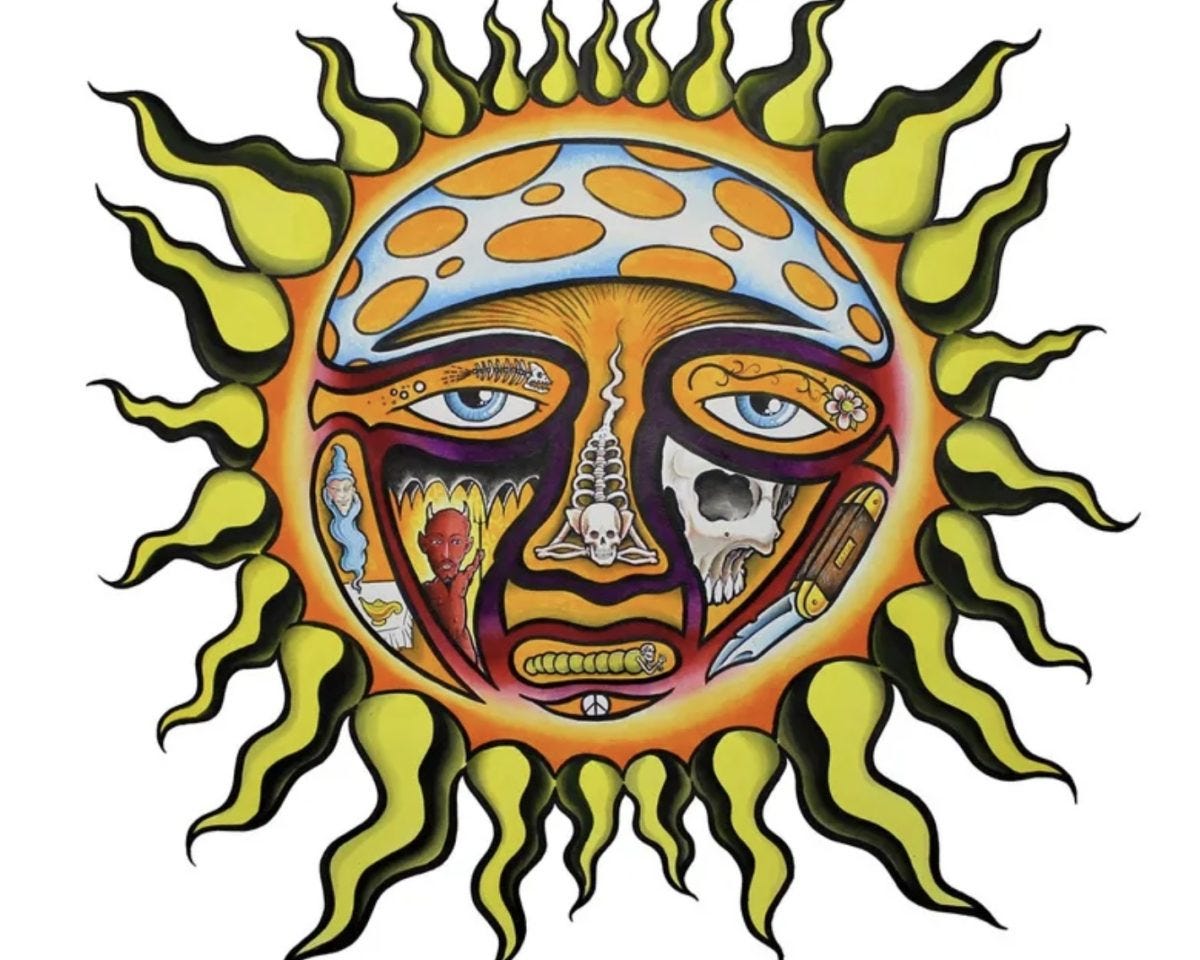In late July I went to an outdoor reggae concert with a dear friend. Ahh, summer. Music. Chill. Vibes. As the presidential election discourse began to escalate in the backdrop, I was glad to be in the midst of artists who sang about revolution, peace, and justice. Ziggy Marley opened with his late father’s “One Love,” while the stadium sang along, and it felt like maybe, just maybe, the collective as we know it could find a way toward love and community amidst all of the division and destruction.
These messages of justice and love affirmed me. They aligned with who I knew myself to be. They reflected me back to me. After all, I was wrapping up my summer course on Power & Privilege, where we delve into matters of oppression and injustice related to the field of education. I was purely exhausted, so it felt good when people on stage with the mic thought like I did. Resonance is an enlivening experience. I haven’t met a soul who doesn’t want to feel validated, and when someone else shares the same mind, experience, or identity, affinity feels safe. The music felt like home.
Until it didn’t. After Ziggy Marley’s band was ushered offstage due to a nearby lightning storm, we waited 45 minutes in the rain for them to come back and finish their set. To the tune of thunder and squeals of “Oh!” at every lighting bolt that felt too close for comfort, and to the sight of covered instruments and uncovered rainbows, we sat. How would Ziggy Marley’s message continue? What would be the take-home call to action from the son of a revolutionary? How would the crowd be moved to rise up and care for each other, especially for the most vulnerable?
We’d never find out because they never came back. I imagine too much time had passed, and perhaps the band had fulfilled their contract, so apparently they all agreed to move on. People cheered as an animal rug was unrolled on the stage floor. Up next, Sublime.

As a teen of the 90s, of course I knew Sublime. In high school I dove head first into ska punk and reggae rock, though by 1996 when Sublime launched to popularity, I was more into the Christian version of ska punk. If you know, you know.
Sublime opened with Date Rape, and every person in our vicinity was singing along. I didn't know and couldn’t hear the words, so I didn’t fully understand the story until Jakob Nowell, son of former lead, yelled, “She didn't want to” over and over. Don’t love this topic, I thought. But maybe he’s as angry as I am about it? Unclear about the song’s message and the band’s M.O., I started to feel conflicted as illicit cartoon imagery filled the screen: drug paraphernalia, angry faces, naked women, grenades, dogs barking. As I looked around, I only saw tall white men with goatees, tattoos, and basketball jerseys yelling along with the band in between puffs of smoke.
As if I was transported back to 1996, I got real judgey. Disgusted. Righteous. I became annoyed with all the men around me. Why do they need to yell? What do they have to be angry about? They just care about feeling good, exploiting women, taunting cops, and bypassing their emotions with their white boy immunity. Irresponsible, immature PUNKS.
I couldn’t hear the words through all the noise.
Sublime bothered me for days. I’d lie in bed mad at them. The bands I was there to see were about peace, love, and justice, but the headliners gave raging white boy energy. It aggravated me so much that finally I woke up. I knew there must be something deeper within me trying to get my attention, so I gently asked myself: What’s underneath your irritation? Is it possible you’re projecting yourself onto them? What are you repressing? After years of doing shadow work, I knew that this kind of trigger was my unconscious trying to get me to see me.
Then it hit me. I’m irritated by white boy punks because I WANT TO BE IRRESPONSIBLE TOO. I spent my summer in a state of ultimate responsibility. I was teaching a very serious topic on Things That Really Matter. I put food on the table and made sure my boys didn’t get into too much trouble. I attended their almost nightly baseball games and ensured uniforms were washed and gloves were found. I graded papers, raced a manuscript deadline, and planned our vacation. I turned 45, embodied anniversaries of trauma, and worried about my health. I was dealing with unexplainable, chronic fatigue, and I was just trying to hold it all together.
So that was it.
I needed a break from responsibility. And I was angry. Just like Sublime. It didn’t take long for the pendulum to swing the other way. Suddenly I felt alive, all because I could now hear my nagging, suppressed truth: What I wouldn’t give to get drunk, flip off a cop, and vandalize a tunnel right now. I wanted to do something real dumb.
So, I made a not-to-be-shared-publicly list of what I would do in my “White Boy Punk Era.” I didn’t do the things on the list (well, not most of them), but the mere process of making the list gave me life. I had new energy. My fatigue began to subside. I could breathe now. The mere function of naming my truth made me feel seen and known, even if only seen and known by me. What a sublime release. Pun intended.
Sublime and the basketball jersey goatee guys annoyed me because I was annoyed at my own self. They were me. Their “give no Fs” attitude, or at least the attitude I perceived in them, was an attitude in my unconscious that was desperate to come into the light. With all my diligent, serious responsibilities of the summer, I had repressed my need to let loose, my need to be free of external expectations, my need for rest. I am obliged and I am wild, not either-or but both-and. This was about an integration of opposites.
Instead of digging my heels into my righteous, responsible, holier-than-white-boy-punks perspective, I was able to see what was really going on, thanks to my previous shadow work, which goes something like this: Release self-judgment. Listen to your body. Consider multiple possibilities for what might be driving you. Identify which one resonates. The thing you once rejected is most likely the part of you asking to be free from imprisonment. Show compassion to her. Welcome her in. She is you. Love her.
I’ve learned that you have to be ready to see truth when the time comes, which is most likely when you’re exhausted from trying to hold everything together all the time. Tired of having to meet everyone’s expectations. Tired of having to be good. Tired of having to be right. Tired of trying to earn love. And when the revelation of reality does arrive, you’ll need self-love as a balm if the truth is to walk through the door.
Maybe my Sublime story is like the parable of the ten virgins.
In short, this parable is a story about ten “virgins” with oil lamps who were waiting for the bridegroom to arrive. Five virgins were foolish because they didn’t bring any lamp oil. All ten got tired while waiting, so they fell asleep. Of course, that’s when the bridegroom shows up, right at midnight. The foolish virgins without any oil asked the wise ones if they could borrow some of theirs. The wise ones were like, “No, go get your own,” so the foolish ones set out to buy some oil, and while they were gone, the bridegroom closed the door on them and married the wise virgins. When the foolish virgins returned from shopping, the bridegroom said, “I don’t know you,” as the virgins shouted and begged him to open the door.
Sheesh. Talk about missing the boat.
First things first. Let’s be so for real right now, Jesus wasn’t talking about a literal harem of women who hadn’t had sex and were waiting for a man to come and save them. Please. He was talking symbolically, in riddles. So what’s the answer to the riddle? Darned if I know, but I’m going to make a best guess just like everyone else does.
During the evangelical Left Behind era, this parable’s message was a clarion call. Always be ready for the second coming of Jesus! We don’t know when he’ll come back to take only the true believers to heaven with him. If Jesus comes back to earth and you haven’t confessed your sins and declared your belief, you’ll be left behind looking around at the real Christians’ empty clothes on the ground. Terrifying. Get that oil now not later! You better accept Jesus as your Lord and Savior while you can, or he will close the door in your face and claim not to know you when he arrives. You’ll be dead to him. This is Christian “love.”
A far different interpretation of the parable is that the virgins and the bridegroom are the same person. Sure, there’s a gendered element here, but only the gendered symbols that exist within every human. The energy of the feminine aligns to the inner life, and the energy of the masculine aligns to what can be revealed. But perhaps more salient is the symbol of virginity, the not-yet-integrated parts of the self. The virgins in the parable are like me that summer, trying to be only one side of a coin (very demure, very mindful) while rejecting the other side (absolutely reckless).
Like me at the concert, the foolish virgins didn’t have the oil, the balm, the fuel, or the flow needed to light their lamps so they could see when it was time to see. This oil is love. Love soothes. It prepares. It anoints. The foolish virgins were left in the dark because they didn’t have the malleability needed to shine light on their opposite, bridegroom self. Likewise, for a time I possessed a rigid, judgey, restrictive, righteous, condemning view of those I deemed irresponsible, which was really just a rejection of myself. I was projecting.
But when I could finally find safety within my own love, the opposites could come into wedded union, just like the wise virgins. My opposites were quite apparent: I am both responsible and ready to throw caution to the wind. I am both highly serious and deeply unserious. I am both content and angry. I have both a Ph.D. and the humor of a middle schooler. These opposites work together. Integrating them into my wholeness keeps me moving throughout life with a decent bit of integrity. When one side is silenced or kept in the dark, it only gets louder, “Open the door for us!” Its need to be known only becomes more dire. In my experience, when left unattended, the rejected self becomes the destructive self.
Cynthia Bourgeault suggests that in the time of Jesus, salvation was understood as a bestowal of life. Jesus was a “life-giver.” He also said he was the truth. I mean, this makes perfect sense when reflecting on the whole born again thing. Truth gives you life. When you integrate your opposites, you can birth, or express, the whole reality of yourself, just like the physical reproductive, life-giving process. It’s liberating.
Bourgeault also points out that Jesus doesn’t say to love your neighbor as much as yourself (which for people who believe they are fundamentally wretches means very little actual self-love). He says to love your neighbor as yourself. Your neighbor IS you. Sublime and the punks WERE me. They were showing me the part of me I had not yet known and therefore had not yet loved. The thing about showing compassion to my own inner rejected self means I can hold compassion for others who are the same. We’re all connected.
This whole shadow work thing isn’t about individualism. At all. On the contrary, you can’t be real with others if you’re not real with yourself. Shadow work is about collective liberation, one soul at a time.
So, am I saying that Sublime and the white boy punks were my bridegroom? Sort of. They showed up in the middle of the night when I was exhausted. They acted as my mirror, showing me my inner punk, who was down on one knee, offering a hand. I’m glad I eventually had enough oil to say yes.






It seems to me that Joe Strummer of The Clash would love this essay. Thank you, Amy, for your work and words. Peace
Great read Amy. In fact, this was fantastic, insightful and grounding. Writing of our Self work can be so much more potent and influential than writing *at* others. This piece captures—in concrete existence—what many find to be ethereal and elusive…shadow work and integration. Do you mind if I share this on Threads with folks that I think it will resonate with?
Ryan (It / Thou)